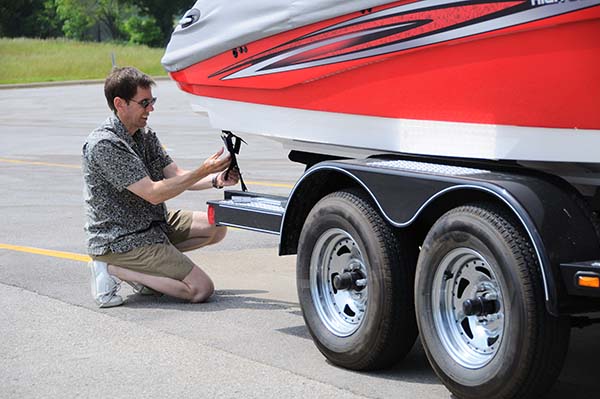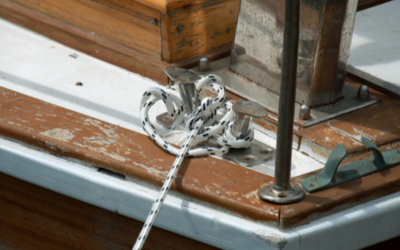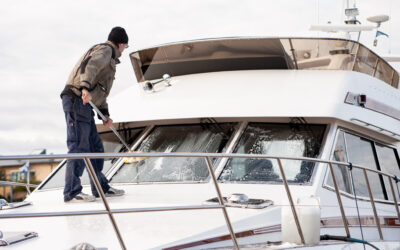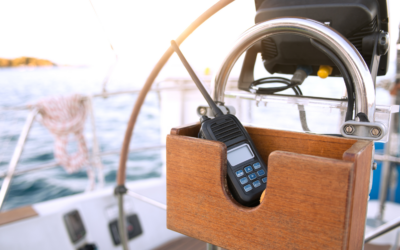Before going on any road trip, checking your car’s tire pressure is a pretty standard thing to do before you hit the road. The same should be done for the tires on your boat trailer before you head out with your boat in tow. The tire pressure on boat trailers often gets overlooked as a necessary part of safe travels with your boat and improperly inflated trailer tires put your passengers and other motorists at risk. Underinflated and consequently, overloaded tires, are the leading cause of trailer-tire failure—the tires overheat and fall apart.
By towing your boat on less than the max psi, it reduces the load capacity of the entire trailer, compromising the safety of the haul. In most cases, boat-trailer tires require a psi between 50 and 65. Trailer tires, like any other tire, have a load range. The load range is marked on the sidewall and ranges from the lowest weight the tire can bear to the heaviest. The correct tire pressure for your boat trailer is almost always the maximum-rated pressure for that tire, which is molded right on the sidewall.
Load range is a measurement of a tire’s maximum ability to transport a boat and trailer. New trailers also have a VIN sticker or a tire-and-load sticker, like the example below, that states the trailer-tire size, the gross weight vehicle rating (GVWR) with those tires, and the specified tire inflation psi.
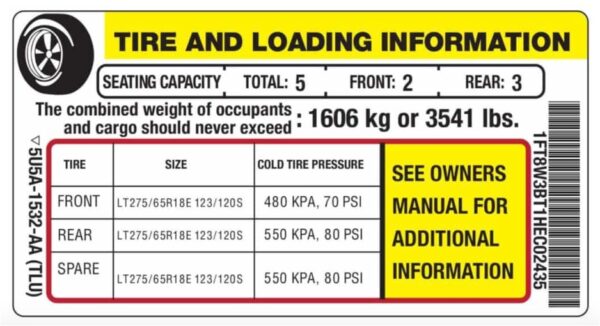
If you can’t find the sticker, call the trailer manufacturer for tire info to ensure safety. If you’re looking at buying a used trailer, check the sticker to make sure the tires already on are the correct size and rating. They may have been replaced with a less-expensive tire with an inadequate rating.
Side note: When checking or buying trailer tires, make sure that the tires are made for trailers. Special trailer tires, unlike vehicle tires, have reinforced sidewalls to withstand the weight of a boat, particularly while rounding curves. The sidewall of a tire lists size, capacity, age, and, most importantly, function; a boat trailer tire will feature the letters “ST” or the phrase “Trailer Use Only” on the sidewall and should be visible when checking the tires.
During your tire checks, if you notice that you have persistently low tire pressure, the stem may be the culprit. Listen for any loss of air by pressing your finger on one side of the stem. If you feel like air is escaping, act fast to prevent any dangerous situations on the road. Make sure you plug the leak if you know how to yourself or get new tires as soon as possible.
When checking the treads on your tires, look for wear and where it is on the tire. Too much tire pressure produces wear in the middle of the tire, whereas too little tire pressure causes wear on the outer edges. The tread depth of automobile and boat trailer tires may be measured using a penny. Place the penny on the tread upside down. If you can see the top of the president’s head, it’s time for new tires.
A common question is what if the trailer tires are filled to the max psi, won’t they be overinflated when they warm up after towing for 100 miles? Could they explode off the rims? Air pressure will rise if the tire warms, or even as ambient air temperature changes, but only by 2 percent for every 10 degrees, and the tire is engineered to handle that extra 2 to 4 psi. If you add air to warm tires, simply reduce the pressure by 2 to 4 psi.
Boat safety begins even before your boat gets into the water. Setting the recommended boat trailer tire pressure is one of the most important things you need to do before heading out to ensure your safety as well as those around you on the road.
